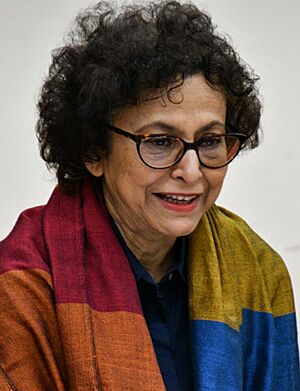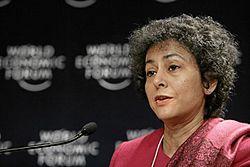Irene Khan facts for kids
Quick facts for kids
Irene Khan
|
|
|---|---|

Khan in 2024
|
|
| UN Special Rapporteur on Freedom of Expression | |
| Assumed office July 2020 |
|
| Preceded by | David Kaye |
| Director-General of the International Development Law Organization | |
| In office January 2012 – December 2019 |
|
| Preceded by | William T. Loris |
| Succeeded by | Jan Beagle |
| Chancellor of the University of Salford | |
| In office 2009–2015 |
|
| Preceded by | Professor Sir Martin Harris |
| Succeeded by | Jackie Kay |
| Secretary-General of Amnesty International | |
| In office 2001–2009 |
|
| Preceded by | Pierre Sané |
| Succeeded by | Salil Shetty |
| Personal details | |
| Born |
Irene Zubaida Khan
24 December 1956 Dhaka, East Pakistan (now Bangladesh) |
| Nationality | Bangladeshi, British |
| Relatives | Mahbub Ali Khan (Uncle) Zubaida Rahman (Cousin) |
| Education | Law |
| Alma mater | University of Manchester Harvard Law School |
Irene Zubaida Khan (born December 24, 1956) is a lawyer and human rights activist from Bangladesh. She is known for her work around the world, especially for protecting people's right to speak and share their opinions freely. Currently, she serves as the United Nations Special Rapporteur for freedom of expression.
Before her role at the UN, she led two major global organizations. From 2001 to 2009, she was the head of Amnesty International, a famous human rights group. Then, from 2012 to 2019, she was the Director-General of the International Development Law Organization (IDLO). The IDLO is a group where governments work together to make sure laws are fair and help countries develop.
Contents
Early Life and Education
Irene Khan was born in Dhaka, which was then in a region called East Pakistan. Today, it is the capital of Bangladesh. Her family has a long history of important figures, including doctors and lawyers.
When Khan was a teenager, a war for independence took place in her home country. This conflict, known as the Bangladesh Liberation War, led to the creation of Bangladesh in 1971. Seeing the terrible events of the war deeply influenced her and inspired her to become a human rights activist.
After the war, she moved to Northern Ireland to continue her schooling. Later, she went to England to study law at the University of Manchester. She continued her studies in the United States at Harvard Law School, where she focused on international law and human rights.
A Career Fighting for Human Rights
Working with the United Nations
In 1980, Khan began her long career at the United Nations. She worked for the UN's refugee agency, the High Commissioner for Refugees (UNHCR), for 20 years. This agency helps people who have been forced to flee their homes because of war or other dangers.
In 1995, she became the youngest person to lead a UNHCR country mission when she was put in charge of the office in India. During the Kosovo crisis in 1999, she led the UNHCR's efforts in Macedonia to help refugees.
Leading Amnesty International

In 2001, Irene Khan became the Secretary General of Amnesty International. This made her the first woman and the first person from Asia to lead the organization.
During her time there, she started important campaigns. One of her first actions was to call for the closure of the Guantanamo Bay detention camp. In 2004, she launched a worldwide campaign to stop violence against women. For this work, she received the Sydney Peace Prize. She also started a campaign called "Demand Dignity" to fight poverty by protecting people's human rights.
Promoting the Rule of Law
In 2012, Khan was chosen to lead the International Development Law Organization (IDLO). She promoted the idea of the rule of law, which means that everyone, including leaders and governments, must follow the law. She believed that fair laws are key to helping people live better lives and creating a more peaceful world.
Special Role at the United Nations
In August 2020, the United Nations Human Rights Council gave Khan a special job. She became the Special Rapporteur on freedom of expression and opinion. This means her role is to protect and promote the right of people everywhere to speak their minds without fear. She was the first woman to be appointed to this position.
As part of her work, she has visited countries like the Philippines and Zambia to check on the state of free speech. She has also spoken out about laws that could limit people's freedom online.
Digital Rights in Bangladesh
Khan has paid close attention to laws in her home country of Bangladesh. She has raised concerns about laws like the Digital Security Act (DSA) and the Cyber Security Act (CSA). She argued that some parts of these laws were too vague and could be used to punish journalists or people who disagree with the government.
Khan believes that protecting freedom of speech online is important for a country's economy. She says that when people are free to share ideas and create new things, it helps the country's digital economy grow.
Awards and Recognition
Irene Khan has received many awards for her work.
- In 2006, she was awarded the Sydney Peace Prize for her leadership in human rights and her campaign against violence against women.
- She has received several honorary doctorates from universities around the world, including the University of London and the University of Manchester.
- In 2009, she was appointed Chancellor of the University of Salford in the UK, a position she held until 2015.
See also
 In Spanish: Irene Khan para niños
In Spanish: Irene Khan para niños
- British Bangladeshi
- List of British Bangladeshis
 | Anna J. Cooper |
 | Mary McLeod Bethune |
 | Lillie Mae Bradford |

